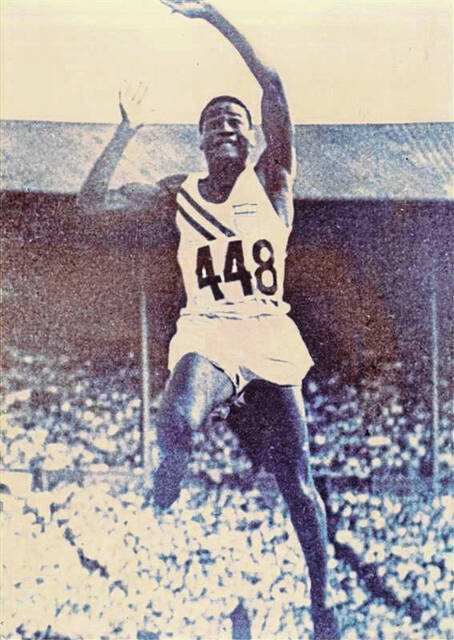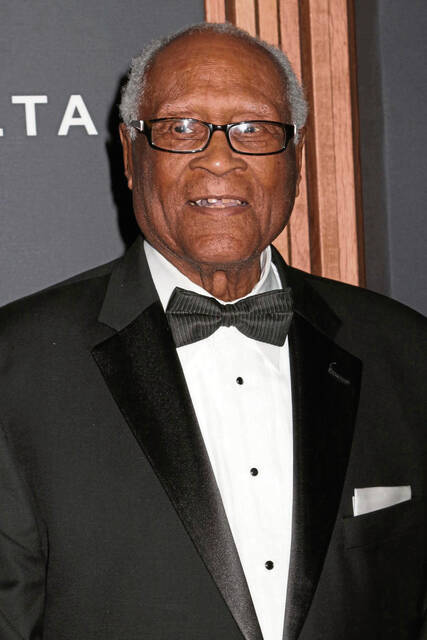Oldest living U.S. Olympic medalist, Pitt great Herb Douglas dies at 101
Roger Kingdom spoke to Herb Douglas only a week ago.
Thinking about their final chat, Kingdom was saddened like so many others when he heard Herbert P. Douglas Jr., the oldest living U.S. Olympic medalist, died Saturday at the age of 101.
Pitt Icon Herb Douglas, the oldest living US Olympic medalist, has passed away at 101 years of age.
The track and field legend was a storied businessman and philanthropist who inspired people the world over. May he rest in peace.
— Pitt Panthers (@Pitt_ATHLETICS) April 24, 2023
“I was sad, but not heartbroken,” said Kingdom, who joins Douglas in representing Pitt as Olympic medal winners. “I was sad because, ‘OK, my daddy Herb is finally gone.’
“But then I started to think about all that he taught me, all the things he shared with me over the years. How candid he always was with me — just like a father talking to his son — and for all the years he invested in me.
“I started to smile. All I could say was, ‘Thank you, Daddy Herb. Thank you. And thank you, Lord, for putting him in my life.’ It brings joy to me now to know that I met that man and that he meant so much to me and, hopefully, I meant so much to him.”
Kingdom, a two-time Olympic gold-medal winner in the 110-meter hurdles in Los Angeles and Seoul, South Korea, first met Douglas at Pitt in 1982. At the time, Kingdom was juggling academics, track and field and football. Douglas became his guiding light, he said.
“I had a lot of decisions to make,” said Kingdom, who later was track coach at Cal (Pa.) and strength and conditioning coach in the NFL with the Arizona Cardinals and Tampa Bay Buccaneers.
“From that day forward, he just became a mentor for me. I called him a surrogate father figure. Over the years, he always imparted his wisdom and his knowledge on me — and encouragement.”
Kingdom had promised his mother he would earn a college degree, and he said Douglas pushed him toward that goal.
“Even though it took me 20 years to get that degree, he still encouraged me the whole way. He understood I was out pursuing track and field as a career.”
Kingdom said Douglas lived by four basic principles: analyze, organize, initiate a plan and follow through.
“With those principles, I used to teach all my kids at Cal U and everyone I spoke to,” he said. “If you stood on those four cardinal principles right there, you should not even have a problem. It meant so much and helped me navigate through all the murky waters to reach the heights that I have.”
Kingdom said when he earned his degree, that was one of Douglas’ proudest moments.
One of the most accomplished athletes in Pitt history, Douglas was honored a year ago as he became a centenarian at events in Hazelwood and at the Sen. John Heinz History Center in the Strip District. He said until a few months before his 100th birthday, when he needed valve replacement heart surgery, he was regularly swimming between an eighth- and a quarter-mile three times weekly.
Kingdom said Douglas’ goal was to reach 100.
“That’s what he always talked about. And the Lord threw a blessing in there of 101,” he said.
Douglas had celebrated previous birthdays at the History Center, where a track uniform and jacket are on permanent display in the Western Pennsylvania Sports Museum portion of the facility.
“We will always tell his story,” Heinz History Center director of marketing and communications Brady Smith said at the time.
“In every role that he filled, as an aspiring athlete from Hazelwood, as a student-athlete and University trustee and as an esteemed businessman, Olympian and community leader, Herb Douglas excelled,” Pitt chancellor Patrick Gallagher said in a statement. “He was both a champion himself and a champion of others, never hesitating to open doors of opportunity and help people pursue their own success.
“Unsurprisingly, Herb left an indelible mark on this world, while leaving an incomprehensible hole in the hearts of so many. I am proud to have called him my friend, and Karen and I will be keeping his family and circle of loved ones close in thought as we begin to honor his remarkable life and legacy.”
Douglas, who won four intercollegiate championships in the long jump and one in the 100-yard dash, graduated from Pitt in 1948 with a degree in physical education and placed second in the Olympic trials in the long jump.
A few months later, he won a bronze medal in London’s 1948 Summer Olympics with a 24-foot, 8.75-inch long jump.
After he stopped competing, he returned to school and earned a master’s degree in education in 1950. Douglas then started a successful career in the business world, eventually becoming one of the first African American officers of a major U.S. company.
He became a sales representative and eventually a special markets manager for the Pabst Brewing Co. not long after graduation from Pitt. During the 1950s and 1960s, there were few African-American salespeople, but Douglas persevered and thrived.
Later, he went to work for Schieffelin & Somerset Co., a premium wine and spirits importer, which eventually became Moet Hennessy. From 1977-80, he worked as vice president of urban market development, one of the first African Americans in that position in the nation.
In his role with the importing company, Douglas helped popularize Hennessy Cognac. He said many African Americans who traveled overseas were treated well and were introduced to cognac, and he expected the same premium brandy options when they returned home.
In the 1970s, he started an initiative to honor his hero with the Jesse Owens Award and Jesse Owens Global Peace Award.
“Herb Douglas led a remarkable life that inspired people the world over,” Pitt athletic director Heather Lyke said in a statement. “Whether it was as an Olympic medalist, accomplished business executive or personal mentor, Herb impacted and was loved by so many. That is certainly the case at the University of Pittsburgh, where his life and legacy are truly enduring.
“On a personal note, one of the greatest blessings for me here has been getting to know Herb and listening to the stories he shared and lessons he taught me. His incredible intellect and determination were only surpassed by his personal kindness. Pitt Athletics is forever indebted to his passion and support. It is so fitting that our future indoor track will be named in Herb’s honor, ensuring his name and legacy live on to inspire future Pitt student-athletes.”
Mr. Douglas was Forever Pitt Proud and always set the pace for the rest of us. He ran the race in an exceptional way that we can only hope to.@Pitt_ATHLETICS will always remember the lessons you taught us - to organize, analyze, initiate and follow through.#H2P https://t.co/meosoSL0Nt
— Heather Lyke (@Pitt_LykeAD) April 24, 2023
Rest in Peace, Herb Douglas.
Not just one of the best Pitt men.
Not just one of the best Pittsburghers.
We lost an American sporting legend who lived a trailblazing life for 101 years. pic.twitter.com/NGU1JTvNZ0
— RJ Sepich (@RJSepich) April 24, 2023
In addition to his track and field success, Douglas also was the first Black basketball player at Allderdice and among the first Black football players at Pitt.
Douglas won Pennsylvania state track championships in the 100- and 220-meter runs and the long jump. After winning four college championships in the long jump and another in the 100 at Pitt, Douglas earned his way onto the Olympic team at age 26. The 1940 and ’44 Games were canceled because of World War II.
He was inducted into the inaugural class of the Pitt Athletics Hall of Fame in 2018. It was announced last year that the 300-meter track at Pitt’s new Victory Heights facility would be named in his honor.
“Herb Douglas meant so much to so many. He was a friend and mentor to me for more than two decades,” said Alonzo Webb, coach of Pitt’s men’s and women’s track and field and cross country teams, in a statement. “Herb had an unwavering commitment to our University and athletics department. Through the Herbert P. Douglas Scholarship, he helped many track and field student-athletes attain a Pitt degree, and he always encouraged them to pursue graduate studies. Herb was a true Pitt ambassador who kept company with Presidents and world leaders. I’ll always treasure our conversations and his wisdom.”
Douglas was a member of Pitt’s Board of Trustees and later named an emeritus trustee.
Douglas was predeceased by his parents, Herbert P. Douglas Sr. and Ilessa Douglas; his sister, Barbara Joy Stevens; and his son, Herbert P. Douglas III.
He is survived by his wife Minerva Douglas, daughter Barbara Joy Ralston of Copenhagen, Denmark; daughter-in-law Susan Douglas of Richmond, Va.; four grandchildren, Tracy Douglas of Richmond, Va., Christopher Douglas of Aldie, Va., Mikel Christianson of Copenhagen, Denmark, and Anja Besnik of Vienna, Austria; as well as by great-grandchildren, grandnieces and grandnephews.
Memorial contributions can be made to the Herbert P. Douglas Jr. Scholarship at the University of Pittsburgh. Service details are pending.
“I’m glad I had a chance to chat with him. I’m glad he was still in good spirits at the time,” Kingdom said. “He was at peace, and he was ready. Mr. Douglas doesn’t do anything he wanted to do until he’s ready.
“When he said he was ready, OK, then all of a sudden, the Lord took him away. He took him away, basically, on his terms.”
Herb P. Douglas Jr. changed Pitt forever. "The ultimate trailblazer" and oldest living U.S. Olympic medalist was a proud Pitt alum who served on the Board of Trustees. Douglas passed away this weekend at 101. https://t.co/moxzUrSVTw pic.twitter.com/iGnqO5tyXG
— University of Pittsburgh (@PittTweet) April 24, 2023
Jerry DiPaola is a TribLive reporter covering Pitt athletics since 2011. A Pittsburgh native, he joined the Trib in 1993, first as a copy editor and page designer in the sports department and later as the Pittsburgh Steelers reporter from 1994-2004. He can be reached at jdipaola@triblive.com.
Remove the ads from your TribLIVE reading experience but still support the journalists who create the content with TribLIVE Ad-Free.




